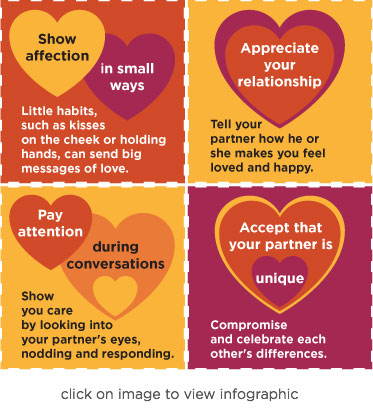Whether it’s making time to catch up at the end of the day or saying something positive to your partner, Kaiser Permanente’s Kitsy Schoen, LCSW, says paying attention is an important part of keeping your relationship strong.
With Valentine’s Day coming up, you may be thinking about a gift for your spouse or partner. Flowers and chocolates can be nice, but your time and attention may be the best gift.
Kaiser Permanente’s Behavioral Health Education Coordinator Kitsy Schoen is a licensed clinical social worker who leads couple’s communication classes at Kaiser Permanente Oakland. She offered advice from the six-week class that any couple can start using right away.

Schoen said most relationships run into trouble because of lack of attention.
“We don’t think about the fact that our relationship needs fuel regularly,” she said. “And like a car, we can’t expect it to take care of itself.”
Know What’s Going On in Your Partner’s Life
Schoen said research done by the Gottman Institute found that couples who are in touch with the day-to-day details of their partner’s life report higher satisfaction than couples who are not in touch.
“Couples should do a daily check-in, and take 10 minutes to hear what each other has to say,” advised Schoen. “Don’t rush into giving advice, but if something hard is happening in your partner’s life, ask how you can be supportive.”
She added that the daily check-in is a way to help you stay connected to how you’re doing, as well.
Remember what it was like when you first started dating? Try to re-create that by having regular date time.
“This is time for doing things you both enjoy and time for each other,” Schoen said. “Stay away from talking about everyday logistics, stressors, or complaints.”
Schoen recommends trying something different together, such as taking a walk somewhere you’ve never been, checking out a new museum, or dancing with each other in your living room.
“The grind of daily life can be hard on relationships. We all do better mood-wise if we do new things, even if they’re small.”
Build Up the Emotional Bank
Make a habit of making four positive comments about your partner for every negative one. Schoen said most of us do the reverse.
“The positive comments don’t have to be deep,” she explained. “They can be as light as, ‘Thank you for making the coffee,’ or, ‘You look great today.’”
Showing appreciation for your partner and making time for each other are ways to create good feelings and build what Schoen calls “the emotional bank.”
“This is important because all relationships go through stressful and difficult times. If you’ve built up a reserve of positive interactions, you’ll have more resources to get through the difficulties.”
When There’s Conflict, Find the Third Way
Forget about winning or losing a fight. Schoen said couples need to figure out a third way, where both partners get what they need. Instead of “me versus you,” think of it as “we versus the problem.”
“If the problem is you’re both pressed for time and the chores aren’t getting done, you might think your partner isn’t doing enough. Instead, you should be coming together to find a solution, so the problem doesn’t come between you, and the situation isn’t so stressful,” she said.
At this point you may be thinking “easier said than done,” and Schoen would tend to agree.
“The third way requires each partner to put aside what he or she is thinking and wanting at the moment to try to understand what the other’s point of view is.”
While it’s not easy, “It can make a huge difference.”
Kaiser Permanente’s Couples Communication classes are offered throughout Northern California and available to the public. Find one near you by typing in “couples communication” in the keyword search on the kp.org health classes page.






This Post Has 4 Comments
Communication, lots of hugs, and lots of love. Thanks for all the information. I think it comes from childhood experience, genetics and environment. But communication and kindness helps a lot in any relationship.
Thanks, Kaiser Permanente, for providing a forum to discuss mental health, not just physical health concerns among our Kaiser Permanente members. Kaiser Permanente is very fortunate to have such a seasoned clinician in Kitsy, who leads these important Couples Communication Classes. I understand you also teach Same Sex Couples Communication at OMC, Kitsy. Would love to see those classes offered at other Northern California sites. Keep up the good work!
Nice photo.
Thank you to Dolores and Kitsy for this great article recognizing the importance of relationship health to our overall mental and physical health. Great tips that many can use. Just a reminder that when abuse is present, these tips won’t be enough. One in 4 women, and nearly 1 in 7 men, have experienced severe physical violence by an intimate partner at some point in their lifetime. If you or someone you know is being hurt or threatened by a spouse or partner, call the National Domestic Violence Hotline for 24/7 support at 800-799-SAFE (800-799-7233).